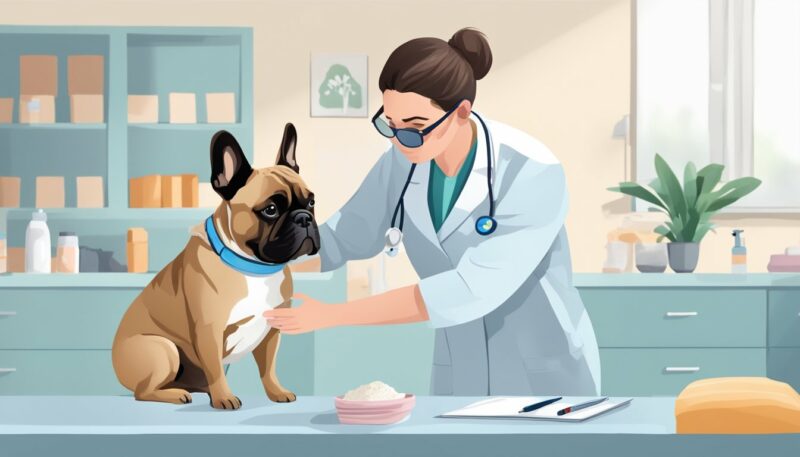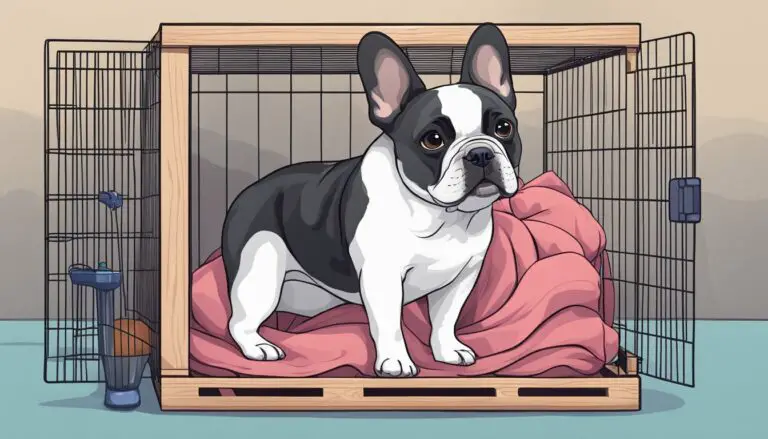How to Treat French Bulldog Allergies

French Bulldogs are an adorable and popular breed, but like many other breeds, they can be prone to allergies. Allergies in French Bulldogs can be caused by various factors such as food ingredients, pollen, or environmental contaminants. As a French Bulldog owner, it’s important to know how to recognize the signs of an allergic reaction and what steps to take to treat your beloved pet’s allergies effectively.
In this guide, we’ll explore practical tips and effective strategies on how to treat French Bulldog allergies, ensuring a healthier and more comfortable life for your furry companion.

Understanding your French Bulldog’s allergies begins with recognizing the symptoms, which may include itching, redness, hives, or even gastrointestinal issues such as vomiting and diarrhea. Once you’ve identified that your French Bulldog is indeed suffering from allergies, seeking the advice of a veterinarian is strongly recommended in order to determine the specific cause of the allergy and receive guidance on treatment options. Through proper diagnosis, treatment, and ongoing care, your French Bulldog can live a happy and healthy life, all while keeping allergies at bay.
Contents
Key Takeaways
- Recognizing symptoms is essential to identifying allergies in French Bulldogs
- Consult a veterinarian to diagnose and treat your pet’s allergies effectively
- Ongoing care and prevention can help your French Bulldog live a healthy life
Table of Contents
Understanding French Bulldog Allergies

As a loving French Bulldog owner, it’s important to understand your furry friend’s unique health needs, including the challenges they may face due to allergies. By gaining knowledge about the types of allergies that affect French Bulldogs and being aware of common allergens, you can better care for your pet and help them live a more comfortable life.
Types of Allergies
There are two primary types of allergies that affect French Bulldogs: environmental allergies and food allergies. Environmental allergies, as the name suggests, are caused by allergens in your dog’s surroundings. These can include pollen, dust, mites, mold spores, and animal dander. Food allergies, on the other hand, occur when your dog’s immune system reacts adversely to specific ingredients or proteins in their diet.
Common Allergens
When it comes to environmental allergens, the following are the most common culprits for French Bulldogs:
- Pollen: A fine powder produced by plants for reproduction; it can easily become airborne and irritate your dog’s respiratory system or skin.
- Dust and mites: Microscopic organisms that live in dust and can cause itching, redness, and other skin irritations.
- Mold spores: Microscopic fungal particles that thrive in damp, warm environments and can cause respiratory and skin issues.
- Animal dander: Tiny particles of skin shed by animals, which can cause allergic reactions in sensitive individuals.
If you suspect your French Bulldog is suffering from environmental allergies, it’s essential to consult with your veterinarian, who can perform appropriate tests and recommend treatment options.
When it comes to food allergies, some common allergens for French Bulldogs include the following:
- Beef
- Dairy
- Chicken
- Wheat
- Soy
If you notice your dog displaying signs of a food allergy, such as vomiting, diarrhea, or chronic itching, it’s crucial to consult with your veterinarian. Your vet can help you develop a plan to identify the specific allergens through an elimination diet and recommend suitable dietary changes to minimize your pet’s symptoms.
In conclusion, being aware of the types of allergies and common allergens affecting French Bulldogs is the key to providing the best care for your four-legged friend. Remember, if you have any concerns, always consult your veterinarian for advice and guidance.
Recognizing the Symptoms

Skin and Coat Issues
Does your French Bulldog have itchy or red skin? Do you notice any hives, rashes, or scabbed skin? These might be symptoms of an allergic reaction. Some common skin conditions in Frenchies include atopic dermatitis and hot spots. Look for other signs like hair loss, bumps, and sores. Regularly examining your dog’s skin and coat can help you spot any changes early on.
Digestive Problems
Have you noticed your Frenchie experiencing diarrhea or vomiting? Are they showing signs of flatulence or a lack of appetite? These could be indicators of a food allergy or sensitivity. Keep an eye on your dog’s digestion and make note of any irregularities. Don’t forget to consult a veterinarian if your dog’s symptoms persist.
Respiratory Distress
Does your Frenchie struggle with breathing difficulties, coughing, or sneezing? Are their eyes or nose runny? Environmental allergies (such as pollen, dust, or mold) might trigger these symptoms. If you notice any respiratory distress, remove any potential allergens and monitor your dog closely. Remember to consult your vet if your dog experiences recurring issues.
Remember, keeping an eye out for symptoms like redness, swelling, inflamed skin, or irritated eyes, ears, and nose is essential to ensure your French Bulldog’s health and happiness. Early detection and treatment of allergies can make all the difference!
How To Treat French Bulldog Allergies
Diagnosing Allergies in French Bulldogs
Are you worried about your French Bulldog’s health due to signs of allergies? The first step in treating these pesky allergies is to get an accurate diagnosis from a veterinarian. Your Frenchie’s symptoms could be caused by food or environmental allergens. Let’s dive into the process of diagnosing allergies in your furry friend.
Your veterinarian will thoroughly examine your dog, paying attention to specific areas like the ears, face, stomach, feet, and toes. They will look for rashes, redness, and any signs of swelling. It’s essential to observe your Frenchie’s behavior and report any excessive scratching or other health issues you’ve noticed.
When you visit the vet, they may perform tests such as blood tests, skin tests, or a food elimination trial. These tests help identify the allergens causing your French Bulldog’s health problems. A food elimination diet can help pinpoint if a particular ingredient is causing an allergic reaction.
Additionally, maintaining a daily log of your dog’s activities and diet can help your veterinarian diagnose the issue more accurately. Track where your Frenchie spends time, the food they eat, any changes in their environment, and note when symptoms appear. This information can help identify patterns in your dog’s behavior and environment that may be contributing to the allergy.
Once your veterinarian has pinpointed the cause of the allergies, they’ll create a customized treatment plan tailored to your French Bulldog’s needs. This plan may include medications, diet alterations, or tips on managing their environment.
So, if your Frenchie has been struggling with allergies, don’t hesitate to seek professional help. Proper diagnosis and treatment will help improve your pup’s quality of life and keep them happy and healthy for years to come.
Treatment Options and Remedies

Medication
If your French Bulldog is suffering from allergies, there are various medications available to help alleviate their symptoms. One option is corticosteroids, which can effectively reduce inflammation and soothe irritated skin. Additionally, antihistamines can be prescribed to help control your Frenchie’s allergic reactions.
Alongside prescription medication, there are also natural skin balms that can help soothe your French Bulldog’s irritated skin. These balms often contain plant-based ingredients that help reduce inflammation and combat yeast and bacteria.
Food Allergy Management
Food allergies are common in French Bulldogs, and they can be managed through careful attention to your dog’s diet. An elimination diet is an effective way to determine the source of your dog’s food allergies. By eliminating common allergens from their diet and gradually reintroducing them, you can pinpoint which foods are causing a reaction.
When choosing food for your French Bulldog, consider the following:
- Opt for grain-free alternatives, as grains can be a common allergen.
- Switch from dry kibble to fresh food, which could be more easily digestible and less likely to cause an allergic reaction.
- Introduce hypoallergenic food options, specially formulated to minimize allergenic ingredients.
- Select a limited ingredient diet, focusing on a single protein source and simple, natural ingredients.
Aside from food choices, you can also support your French Bulldog’s gut health by adding probiotics and allergy supplements to their diet. These can help boost their immune system and increase resistance to allergens.
While managing your French Bulldog’s allergies may seem challenging, following these tips and working with your veterinarian can help your furry friend live a comfortable and happy life. Remember always to monitor their symptoms and make adjustments as needed.
Preventing Allergy Flare-ups

As a loving French Bulldog owner, you might be wondering how to prevent allergy flare-ups for your furry friend. Frenchies are a brachycephalic breed, which makes them prone to certain conditions. Don’t worry, we’ve got you covered with some simple tips to keep your pooch itch-free and happy!
One key factor to consider is your dog’s environment. Just like people, Frenchies can experience allergies to pollen, dust, or mold. Make sure you keep your living space clean and well-ventilated. Regularly vacuum and dust to eliminate allergens in the air. You can also use air purifiers and hypoallergenic bedding to ensure your pup’s sleeping area stays free of allergens.
Your French Bulldog’s hygiene is another essential aspect to consider. Due to their facial folds, Frenchies are especially susceptible to skin irritations. A little extra care can go a long way! Gently clean their face wrinkles and folds with a soft, damp cloth daily to remove dirt and debris. This simple act can significantly reduce the risk of developing pruritus (itching) and other skin conditions.
In addition to keeping their living space clean and maintaining good hygiene, you should also be mindful of the products you use on your Frenchie. Opt for gentle, hypoallergenic grooming products, such as shampoos and conditioners, to avoid potential allergens and irritating chemicals. This can help prevent itching and rubbing, which are common signs of allergies in dogs.
Lastly, it’s crucial to be proactive about your Frenchie’s overall health. Regular veterinary check-ups can help identify any potential allergens or issues before they escalate. If you notice any changes in your dog’s behavior or appearance, such as excessive itching or redness, consult your veterinarian for professional advice.
In summary, ensuring a clean environment, practicing good hygiene, using hypoallergenic products, and visiting the vet regularly are all essential steps for preventing allergy flare-ups in your French Bulldog. With these simple tips, your Frenchie will enjoy a healthier, comfortable life!
Understanding Food Intolerance vs Allergies

When dealing with your French Bulldog’s dietary issues, it’s crucial to understand the difference between food allergies and food intolerances. Food allergies involve an immune system reaction, while food intolerance is a digestive system response.
Common Food Intolerances
Food intolerance in French Bulldogs typically results from their inability to properly digest certain types of food. Some common food intolerances include:
- Dairy products: Milk and other dairy products can be difficult for your Frenchie to digest due to the presence of lactose.
- Wheat and grains: Some dogs struggle to break down complex carbohydrates, leading to digestive issues.
- Protein sources, such as chicken, fish, beef, lamb, and soy: Just like humans, dogs can be intolerant to specific proteins.
Food allergies, on the other hand, involve an immune system response to a particular ingredient, usually a protein. Common food allergens for French Bulldogs include:
- Dairy products: Like humans, some Frenchies can have an allergic reaction to cow’s milk and other dairy products.
- Eggs: Some dogs are allergic to the proteins found in eggs.
- Wheat, corn, and soy: These grains and legumes can cause an allergic reaction in some dogs.
Remember, when dealing with dietary issues, it’s important to accurately identify whether your French Bulldog is experiencing a food intolerance or an allergy. An accurate diagnosis will help guide you in finding the most effective treatment for your furry friend. Consult your veterinarian if you’re unsure about the root cause of the issue—they can help you determine whether it’s an intolerance or allergy, and suggest appropriate management strategies.
Caring for Your Allergic French Bulldog

Taking care of your French Bulldog puppy can be a bit challenging if they suffer from allergies. Don’t worry, though! With a little extra effort, you can help manage their allergies and keep them healthy and happy.
First, observe your Frenchie’s behavior to identify any allergy symptoms. Common symptoms include scratching, hair loss, inflamed eyes, paw licking, or face and ear infections. You may notice some redness and inflammation around their nose or stomach, along with rashes caused by skin allergies or dermatitis.
To find the source of allergies, you may need to consider an elimination diet. Start by removing potential food allergens from your dog’s diet for 7-10 days, such as specific proteins, soy, or grains. If symptoms subside, reintroduce items one at a time to find the culprit.
It’s important to maintain a clean environment for your Frenchie. Consider using air purifiers and hypoallergenic products, and avoid allergen-releasing plants like ragweed in your yard. Regularly groom your French Bulldog to remove allergens like pollen, dander, and mold from their coat. Proper grooming also helps prevent ear infections and bacterial growth.
If your dog’s allergies are severe, you may need to consult your veterinarian for medical intervention. Depending on their condition, treatments like antihistamines or corticosteroids may be necessary to reduce symptoms. Topical ointments can help heal skin irritations but be cautious, as they may lick the ointment off. Apply treatments when your Frenchie is sleepy, or distract them for about 15-20 minutes to let the ointment work.
Lastly, remember that a healthy immune system can help manage their histaminic response and avoid anaphylactic shock. Ensure your Frenchie receives proper nutrition, exercise, and care to keep their immune system strong.
If you follow these tips, you’ll be well on your way to caring for your allergic French Bulldog, ensuring they feel comfortable and loved.
FAQs: How to Treat French Bulldog Allergies

What food helps soothe skin allergies in French Bulldogs?
If your French Bulldog is suffering from skin allergies, it’s essential to feed them a diet that’s gentle on their sensitive skin. One option is switching to a high-quality hypoallergenic dog food, often made with limited ingredients and alternative protein sources, such as fish or venison. You can also try adding omega-3 fatty acids, like those found in fish oil or flaxseed oil, to their diet, which can help reduce inflammation and improve skin health.
How much does a French Bulldog allergy test cost?
Allergy testing for your French Bulldog can vary in cost, depending on the type of test and where it’s performed. Blood tests can range from $200 to $300, while intradermal skin testing can cost between $250 and $500. It’s important to consult with your veterinarian to determine the right allergy test for your Frenchie and discuss cost options.
What common allergy symptoms do French Bulldogs experience?
French Bulldogs can experience a range of allergy symptoms, such as itchiness, redness, and swelling of the skin, hives, sneezing, watery eyes, and even ear infections. If you notice your Frenchie exhibiting any of these symptoms, it’s essential to consult with a veterinarian to determine the cause and establish an appropriate treatment plan.
How can I identify food allergies in my French Bulldog?
Food allergies in French Bulldogs can manifest as gastrointestinal issues, like vomiting and diarrhea, or skin problems, such as itching and rashes. A way to identify the specific allergen is to implement an elimination diet. This involves feeding your Frenchie a limited-ingredient diet and gradually introducing potential allergens. Monitor your dog’s reactions closely, and consult with your veterinarian throughout the process to ensure the diet is nutritionally balanced.
Which medications can be given to French Bulldogs for allergies?
There are several medications that can be prescribed for French Bulldogs with allergies, such as antihistamines, corticosteroids, and immunosuppressive drugs. In some cases, a vet may recommend allergy shots or sublingual immunotherapy (SLIT) to help reduce your Frenchie’s sensitivity to allergens. Always consult with a veterinarian before administering any medication to your pet.
What should I do if my Frenchie has an allergic reaction?
If your French Bulldog is experiencing an allergic reaction, it’s crucial to seek veterinary care as soon as possible. While mild reactions can often be managed at home with over-the-counter medications, more severe reactions may require immediate attention. In case of an emergency, make sure to be prepared with your emergency vet’s contact information and a list of your Frenchie’s current medications and potential allergens.






